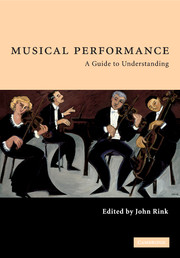12 - The fear of performance
Published online by Cambridge University Press: 05 June 2012
Summary
The analysis of performance anxiety
Performance anxiety, commonly known as ‘stage fright’, is an age-old problem, but interest in its nature, causes and cures has intensified over the last fifteen years with the burgeoning of clinics, conferences and journals devoted to performing arts medicine. Music performance anxiety has been defined as ‘the experience of persisting, distressful apprehension about[,] and/or actual impairment of, performance skills in a public context, to a degree unwarranted given the individual's musical aptitude, training, and level of preparation’. Notable sufferers have included Maria Callas, Enrico Caruso, Pablo Casals, Leopold Godowsky, Vladimir Horowitz, Ignacy Paderewski and Sergei Rachmaninoff. A number of surveys have indicated that performance anxiety is a serious problem for a substantial proportion of musicians. In one large-scale study of American orchestras, stage fright was the most frequently reported performance problem, with 24 per cent of players claiming to be affected by it, and 15 per cent finding it severe. It is ameliorated by age and experience, though whether this is due to the beneficial effects of exposure or to ‘survival of the fittest’ is not clear.
The symptoms of performance anxiety are well known and are of three kinds: physiological, behavioural and mental. The physiological symptoms of increased heart rate, palpitations, shortness of breath, hyperventilation, dry mouth, sweating, nausea, diarrhoea and dizziness are the result of over-arousal of the autonomic nervous system.
- Type
- Chapter
- Information
- Musical PerformanceA Guide to Understanding, pp. 168 - 182Publisher: Cambridge University PressPrint publication year: 2002
References
- 16
- Cited by



